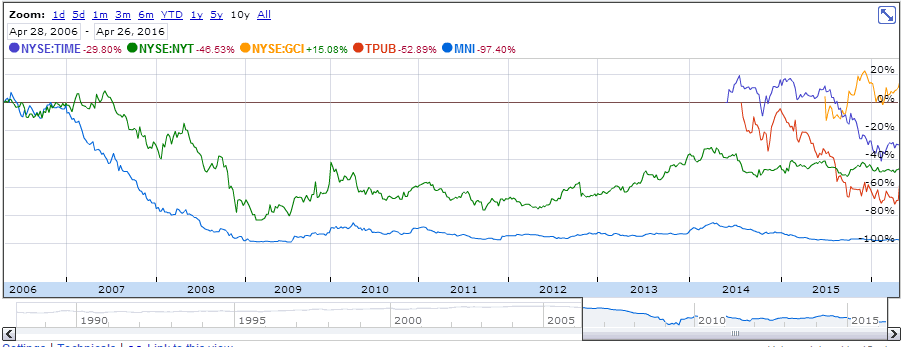The Daily Obituary
As far as being an investable business goes, news is horrible.
And it is getting worse by the day.
Look at these top performers.

The above chart looks ugly, but in reality it puts an optimistic spin on things...
- it has survivorship bias
- the Tribune Company has already went through bankruptcy
- the broader stock market is up huge over the past decade after many rounds of quantitative easing and zero (or even negative) interest rate policy
- the debt carrying costs of the news companies are also artificially low due to the central banking bond market manipulation
- the Tribune Company recently got a pop on a buy out offer
Selling The Story
Almost all the solutions to the problems faced by the mainstream media are incomplete and ultimately will fail.
That doesn't stop the market from selling magic push button solutions. The worse the fundamentals get, the more incentive (need) there is to sell the dream.
Video
Video will save us.
No it won't.
Video is expensive to do well and almost nobody at any sort of scale on YouTube has an enviable profit margin. Even the successful individuals who are held up as the examples of success are being squeezed out and Google is trying to push to make the site more like TV. As they get buy in from big players they'll further squeeze out the indy players - just like general web search.
Even if TV shifts to the web, along with chunks of the associated ad budget, most of the profits will be kept by Google & ad tech management rather than flowing to publishers.
Some of the recent acquisitions are more about having more scale on an alternative platform or driving offline commerce rather than hoping for online ad revenue growth.
Expand Internationally
The New York times is cutting back on their operations in Paris.
Spread Across Topics
What impact does it have on Marketwatch's brand if you go there for stocks information and they advise you on weight loss tips?
And, once again, when everyone starts doing that it is no longer a competitive advantage.
There have also been cases where newspapers like The New York Times acquired About.com only to later sell it for a loss. And now even About.com is unbundling itself.
Native Ads
The more companies who do them & the more places they are seen, the lower the rates go, the less novel they will seem, and the greater the likelihood a high-spending advertiser decides to publish it on their own site & then drive the audience directly to their site.
When it is rare or unique it stands out and is special, justifying the extra incremental cost. But when it is a scaled process it is no longer unique enough to justify the vastly higher cost.
Further, as it gets more pervasive it will lead to questions of editorial integrity.
Get Into Affiliate Marketing
It won't scale across all the big publishers. It only works well at scale in select verticals and as more entities test it they'll fill up the search results and end up competing for a smaller slice of attention. Further, each new affiliate means every other affiliate's cookie lasts for a shorter duration.
It is unlikely news companies will be able to create commercially oriented review content at scale while having the depth of Wirecutter.
“We move as much product as a place 10 times bigger than us in terms of audience,” Lam said in an interview. “That’s because people trust us. We earn that trust by having such deeply-researched articles.”
Further, as it gets more pervasive it will lead to questions of editorial integrity.
Charging People to Comment
It won't work, as it undermines the social proof of value the site would otherwise have from having many comments on it.
Meal Delivery Kits
Absurd. And a sign of extreme desperation.
Trust Tech Monopolies
Here is Doug Edwards on Larry Page:
He wondered how Google could become like a better version of the RIAA - not just a mediator of digital music licensing - but a marketplace for fair distribution of all forms of digitized content. I left that meeting with a sense that Larry was thinking far more deeply about the future than I was, and I was convinced he would play a large role in shaping it.
If we just give Google or Facebook greater control, they will save us.
No they won't.
You are probably better off selling meal kits.
As time passes, Google and Facebook keep getting a larger share of the pie, growing their rake faster than the pie is growing.
Here is the RIAA's Cary Sherman on Google & Facebook:
Just look at Silicon Valley. They’ve done an extraordinary job, and their market cap is worth gazillions of dollars. Look at the creative industries — not just the music industry, but all of them. All of them have suffered.
Over time media sites are becoming more reliant on platforms for distribution, with visitors having fleeting interest: "bounce rates on media sites having gone from 20% of visitors in the early 2000s to well over 70% of visitors today."
Accelerated Mobile Pages and Instant Articles?
These are not solutions. They are only a further acceleration of the problem.
How will giving greater control to monopolies that are displacing you (while investing in AI) lead to a more sustainable future for copyright holders? If they host your content and you are no longer even a destination, what is your point of differentiation?
If someone else hosts your content & you are depended on them for distribution you are competing against yourself with an entity that can arbitrarily shift the terms on you whenever they feel like it.
“The cracks are beginning to show, the dependence on platforms has meant they are losing their core identity,” said Rafat Ali “If you are just a brand in the feed, as opposed to a brand that users come to, that will catch up to you sometime.”
Do you think you gain leverage over time as they become more dominant in your vertical? Not likely. Look at how Google's redesigned image search shunted traffic away from the photographers. Google's remote rater guidelines even mentioned giving lower ratings to images with watermaks on them. So if you protect your works you are punished & if you don't, good luck negotiating with a monopoly. You'll probably need the EU to see any remedy there.
When something is an embarrassment to Google & can harm their PR fixing it becomes a priority, otherwise most the costs of rights management fall on the creative industry & Google will go out of their way to add cost to that process. Facebook is, of course, playing the same game with video freebooting.
Algorithms are not neutral and platforms change what they promote to suit their own needs.
As the platforms aim to expand into new verticals they create new opportunities, but those opportunities are temporal.
Whatever happened to Zynga?
Even Buzzfeed, the current example of success on Facebook, missed their revenue target badly, even as they become more dependent on the Facebook feed.
"One more implication of aggregation-based monopolies is that once competitors die the aggregators become monopsonies — i.e. the only buyer for modularized suppliers. And this, by extension, turns the virtuous cycle on its head: instead of more consumers leading to more suppliers, a dominant hold over suppliers means that consumers can never leave, rendering a superior user experience less important than a monopoly that looks an awful lot like the ones our antitrust laws were designed to eliminate." - Ben Thompson
Long after benefit stops passing to the creative person the platform still gets to re-use the work. The Supreme Court only recentlyrefused to hear the ebook scanning case & Google is already running stories about using romance novels to train their AI. How long until Google places their own AI driven news rewrites in front of users?
Who then will fund journalism?
Dumb it Down

Remember how Panda was going to fix crap content for the web? eHow has removed literally millions of articles from their site & still has not recovered in Google. Demand Media's bolt-on articles published on newspaper sites still rank great in Google, but that will at some point get saturated and stop being a growth opportunity, shifting from growth to zero sum to a negative sum market, particularly as Google keeps growing their knowledge scraper graph.
Now maybe if you dumb it down with celebrity garbage you get quick clicks from other channels and longterm SEO traffic doesn't matter as much.
But if everyone is pumping the same crap into the feed it is hard to stand out. When everyone starts doing it the strategy is no longer a competitive advantage. Further, if you build a business that is algorithmically optimized for short-term clicks is also optimizing for its own longterm irrelevancy.
Yahoo’s journalists used to joke amongst themselves about the extensive variety of Kind bars provided, but now the snacks aren’t being replenished. Instead, employees frequently remind each other that there is little reason to bother creating quality work within Yahoo’s vast eco-system of middle-brow content. “You are competing against Kim Kardashian’s ass,” goes a common refrain.
...
Yahoo’s billion-person-a-month home page is run by an algorithm, with a spare editorial staff, that pulls in the best-performing content from across the site. Yahoo engineers generally believed that these big names should have been able to support themselves, garner their own large audiences, and shouldn’t have relied on placement on the home page to achieve large audiences. As a result, they were expected to sink or swim on their own.
...
“Yahoo is reverting to its natural form,” a former staffer told me, “a crap home page for the Midwest.”
That is why Yahoo! ultimately had to shut down almost all their verticals. They were optimized algorithmically for short term wins rather than building things with longterm resonance.
Death by bean counter.
The above also has an incredibly damaging knock on effect on society.
People miss the key news. "what articles got the most views, and thus "clicks." Put bluntly, it was never the articles on my catching Bernanke pulling system liquidity into the maw of the collapse in 2008, while he maintained to Congress he had done the opposite." - Karl Denninger
The other issue is PR is outright displacing journalism. As bad as that is at creating general disinformation, it gets worse when people presume diversity of coverage means a diversity of thought process, a diversity of work, and a diversity of sources. Even people inside the current presidential administration state how horrible this trend is on society:
“All these newspapers used to have foreign bureaus,” he said. “Now they don’t. They call us to explain to them what’s happening in Moscow and Cairo. Most of the outlets are reporting on world events from Washington. The average reporter we talk to is 27 years old, and their only reporting experience consists of being around political campaigns. That’s a sea change. They literally know nothing.” ... “We created an echo chamber,” he told the magazine. “They [the seemingly independent experts] were saying things that validated what we had given them to say.”
That is basically the government complaining to the press about it being "too easy" to manipulate the press.
Adding Echo to the Echo
Much of what "seems" like an algorithm on the tech platforms is actually a bunch of lowly paid humans pretending to be an algorithm.
This goes back to the problem of the limited diversity in original sources and rise of thin "take" pieces. Stories with an inconvenient truth can get suppressed, but "newsworthy" stories with multiple sources covering them may all use the same biased source.
After doing a tour in Facebook’s news trenches, almost all of them came to believe that they were there not to work, but to serve as training modules for Facebook’s algorithm. ... A topic was often blacklisted if it didn’t have at least three traditional news sources covering it
As algorithms take over more aspects of our lives and eat more of the media ecosystem, the sources they feed upon will consistently lose quality until some sort of major reset happens.
The strategy to keep sacrificing the long term to hit the short term numbers can seem popular. And then, suddenly, death.
You can say the soul is gone
And the feeling is just not there
Not like it was so long ago.
- Neil Young, Stringman
Micropayments & Paywalls
It is getting cheap enough that just about anyone can run a paid membership site, but it is quite hard to create something worth paying for on a recurring basis.
There are a few big issues with paywalls:
- If you have something unique and don't market it aggressively then nobody will know about it. And, in fact, in some businesses your paying customers may have no interest in sharing your content because they view it as one of their competitive advantages. This was one of the big reasons I ultimately had to shut down our membership site.
- If you do market something well enough to create demand then some other free sites will make free derivatives, and it is hard to keep having new things to write worth paying for in many markets. Eventually you exhaust the market or get burned out or stop resonating with it. Even free websites have churn. Paid websites have to bring in new members to offset old members leaving.
- In most markets worth being in there is going to be plenty of free sites in the vertical which dominate the broader conversation. Thus you likely need to publish a significant amount of information for free which leads into an eventual sale. But knowing where to put the free line & how to move it over time isn't easy. Over the past year or two I blogged far less than I should have if I was going to keep running our site as a paid membership site.
- And the last big issue is that a paywall is basically counter to all the other sort of above business models the mainstream media is trying. You need deeper content, better content, content that is not off topic, etc. Many of the easy wins for ad funded media become easy losses for paid membership sites. And just like it is hard for newspapers to ween themselves off of print ad revenues, it can be hard to undo many of the quick win ad revenue boosters if one wants to change their business model drastically. Regaining you sou takes time, and often, death.

“It's only after we've lost everything that we're free to do anything.” ― Chuck Palahniuk, Fight Club


